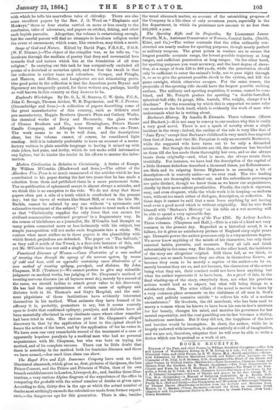Sir Goodwin's Folly; a Story of the Year 1795. By
Arthur Locker. Three volumes. (Chapman and Hall.)—This is a tale of a kind not very
common in the present day. Regarded as a historical novel, it is a
failure, for it gives no satisfactory picture of England sixty-eight years ago. Dramatic power the author possesses only in a very moderate degree.
We never know anything of the minds of his characters, but only their external habits, pursuits, and manners. They all talk and think substantially in the same way. But then, on the other hand, the incidents of the story are altogether original. Still these fail, as we think, to interest; not so much because they are often in themselves bizarre, as because they seem to be merely a caprice of the author—to be so, merely because they are so, and not because, the characters of the actors being what they are, their conduct could not have been anything but what the author represents it to have been. As a proof of this, in the final winding-up of the story, everybody does, not what his previous
actions would lead us to expect, but what will bring things to a satisfactory close. The utter villain of the novel is moved to tears by
a very common-place sermonette on the sinfulness of all men in God's sight, and politely commits suicide " to relieve his wife of a useless encumbrance." Sir Goodwin, the old merchant, who has been mad to marry a woman whom he knows to have been his son-in-law's mistress for her beauty, changes his mind, and marries his governess for her mental superiority, and the roué gambling son-in-law becomes a thrifty, industrious merchant. But if they did not, the happiness of the hero and heroine would be incomplete. In short, the author, while he is largely endowed with invention, is almost entirely devoid of imagination, and we are not, therefore, sanguine that he will ever be able to write a fiction which can be praised as a work of art.


































 Previous page
Previous page